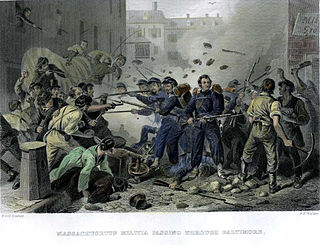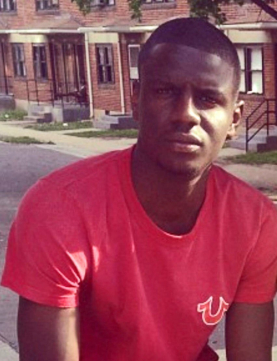
The Baltimore riot of 1861 was a civil conflict on Friday, April 19, 1861, on Pratt Street, in Baltimore, Maryland. It occurred between antiwar "Copperhead" Democrats and other Southern/Confederate sympathizers on one side, and on the other, members of Massachusetts and Pennsylvania state militia regiments en route to the national capital at Washington who had been called up for federal service. The fighting began at the President Street Station, spreading throughout President Street and subsequently to Howard Street, where it ended at the Camden Street Station. The riot produced the first deaths of Union volunteers by hostile action, although caused by civilians, in the American Civil War. Civilians among the attackers also were killed.

Following the assassination of Martin Luther King Jr., a leading African-American civil rights activist, on April 4, 1968, Washington, D.C., experienced a four-day period of violent civil unrest and rioting. Part of the broader riots that affected at least 110 U.S. cities, those in Washington, D.C.—along with those in Chicago and in Baltimore—were among those with the greatest numbers of participants. President Lyndon B. Johnson called in the National Guard to the city on April 5, 1968, to assist the police department in quelling the unrest. Ultimately, 13 people were killed, with approximately 1,000 people injured and over 6,100 arrested.
The Baltimore riot of 1968 was a period of civil unrest that lasted from April 6 to April 14, 1968, in Baltimore. The uprising included crowds filling the streets, burning and looting local businesses, and confronting the police and national guard.

The Great Railroad Strike of 1877, sometimes referred to as the Great Upheaval, began on July 14 in Martinsburg, West Virginia, after the Baltimore and Ohio Railroad (B&O) cut wages for the third time in a year. The Great Railroad Strike of 1877 was the first strike that spread across multiple states in the U.S. The strike finally ended 52 days later, after it was put down by unofficial militias, the National Guard, and federal troops. Because of economic problems and pressure on wages by the railroads, workers in numerous other states, from New York, Pennsylvania and Maryland, into Illinois and Missouri, also went out on strike. An estimated 100 people were killed in the unrest across the country. In Martinsburg, Pittsburgh, Philadelphia and other cities, workers burned down and destroyed both physical facilities and the rolling stock of the railroads—engines and railroad cars. Some locals feared that workers were rising in revolution, similar to the Paris Commune of 1871, while others joined their efforts against the railroads.

Thomas Ludwig John D'Alesandro III was an American attorney and politician who served as the 44th mayor of Baltimore from 1967 to 1971. A member of the Democratic Party, he was the president of the Baltimore City Council from 1962 to 1967. During his tenure as mayor, the Baltimore riot of 1968 occurred. He was the eldest son of Thomas D'Alesandro Jr., the 41st mayor of Baltimore; and brother of Nancy Pelosi, the 52nd speaker of the United States House of Representatives, and first woman to hold that office.
Baltimore riots can refer to several incidents of civil unrest in Baltimore, Maryland's history. It generally refers to the Baltimore Riot of 1861, where a mob of Confederate Southern sympathizers attacked newly raised Union state militia troops transiting through the town on April 18–19, 1861 in some of the first bloodshed of the American Civil War.

Camden Station, now also referred to as Camden Street Station, Camden Yards, and formally as the Transportation Center at Camden Yards, is a train station at the intersection of South Howard and West Camden Streets in Baltimore, Maryland, adjacent to Oriole Park at Camden Yards, behind the B&O Warehouse. It is served by MARC commuter rail service and local Light Rail trains.
A labour revolt or worker's uprising is a period of civil unrest characterised by strong labour militancy and strike activity. The history of labour revolts often provides the historical basis for many advocates of Marxism, communism, socialism and anarchism, with many instances occurring around the world in both the 19th and 20th centuries.

The King assassination riots, also known as the Holy Week Uprising, were a wave of civil disturbance which swept across the United States following the assassination of Martin Luther King Jr. on April 4, 1968. Some of the biggest riots took place in Washington, D.C., Baltimore, Chicago, and Kansas City.
The following is a timeline of the history of the city of Baltimore, Maryland, USA.
The American city of Baltimore, Maryland, is notorious for its crime rate, which ranks well above the national average. Violent crime spiked in 2015 after the death of Freddie Gray on April 19, 2015, which touched off riots and an increase in murders. The city recorded 348 homicides in 2019, a number second only to the number recorded in 1993 when the population was nearly 125,000 higher.
The Cambridge riot of 1967 was one of 159 race riots that swept cities in the United States during the "Long Hot Summer of 1967". This riot occurred on July 24, 1967 in Cambridge, Maryland, a county seat on the Eastern Shore. For years racial tension had been high in Cambridge, where black people had been limited to second-class status. Activists had conducted protests since 1961, and there was a riot in June 1963 after the governor imposed martial law. "The Treaty of Cambridge" was negotiated among federal, state, and local leaders in July 1963, initiating integration in the city prior to passage of federal civil rights laws.

On April 12, 2015, Freddie Carlos Gray Jr., a 25-year-old African American, was arrested by the Baltimore Police Department for possession of a knife. While in police custody, Gray sustained fatal injuries and was taken to the R Adams Cowley Shock Trauma Center. Gray died on April 19, 2015; his death was ascribed to injuries to his cervical spinal cord.

On April 12, 2015, Baltimore Police Department officers arrested Freddie Gray, a 25-year-old African American resident of Baltimore, Maryland. Gray's neck and spine were injured while he was in a police vehicle and he went into a coma. On April 18, there were protests in front of the Western district police station. Gray died on April 19.
The 1968 Detroit riot was a civil disturbance that occurred between April 4–5, 1968 in Detroit, Michigan following the assassination of Martin Luther King Jr. Less than a year after the violent unrest of 1967, areas of 12th Street again erupted in chaos following King's assassination. Michigan Governor George W. Romney ordered the National Guard into Detroit. One person was killed, and gangs tossed objects at cars and smashed storefront windows with three dozen fires being set.

The term ghetto riots, also termed ghetto rebellions, race riots, or negro riots refers to summer social unrest across the United States in the mid-to-late 1960s, characterized by African American groups using violent tactics.

The Baltimore Know-Nothing riots of 1856 occurred in Baltimore, Maryland between September and November of that year. The Know-Nothing Party gained traction in Baltimore as native-born residents disliked the growing immigrant population. Local street gangs became divided on political grounds, with the Know-Nothing affiliated gangs clashing with gangs affiliated with the Democratic Party. The partisans were involved in widespread violence at the polls and across Baltimore during municipal and national elections that year.










